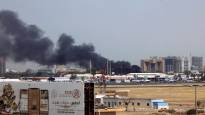The violence that broke out in the capital, Khartoum, and elsewhere in the country is the result of a power struggle between two military leaders.
At least 56 civilians have been killed and more than 600 injured over the weekend in Sudan, located in North Africa, as two armed forces clashed across the country.
What is the background of the unrest?
A military council has ruled Sudan since the October 2021 coup.
At the center of the fighting that has broken out now are two soldiers who both want to lead the Sudanese armed forces and thereby the whole country.
Currently, the commander of the armed forces and practically the president of the country is a general Abdel Fattah al-Burhan.
The country also operates the Rapid Support Forces (RSF), which is about 100,000 strong and is led by General Mohamed Hamdan Dagalo.
These men disagree with the proposed transition to civilian rule.
One of the biggest points of contention is how the RFS force will be integrated into the army and who will ultimately lead this new force.
Why did the fighting start now?
Relations between the two military forces have been strained in recent weeks. When RSF troops began to be moved around the country, the army interpreted this as a threat.
It is not clear who fired the first shot Saturday. Both sides accuse each other of provoking the conflict.
External powers have called on the parties to stop fighting.
What kind of group is RSF?
The RSF was founded in Sudan in 2013 and has its roots in the Janjaweed militia that fought rebels in the Darfur conflict.
The military force that was previously under the control of the Sudanese government has grown into a significant regional military force in the hands of General Dagalo.
The RSF has fought in Yemen and Libya on the side of rebel groups and controls some of Sudan’s gold mines.
Dagalo’s forces have also been accused of human rights violations, for example the massacre of more than 120 protesters in June 2019.
Observers outside of Sudan have estimated that a military force operating independently of the state increases the country’s instability.
Why are the soldiers in power?
The president who ruled Sudan for almost three decades Omar al-Bashir was ousted in 2019 in a military coup.
After the army came to power, the citizens continued to protest, demanding a transition to democratic governance. A joint military-civilian government was established, but was overthrown in another coup in October 2021.
Since then, the rivalry between Burhan and Dagalo has intensified.
Last December, the parties reached a preliminary agreement on transferring power back to civilians, but negotiations on the implementation of the plan have failed.
What can happen next?
If the fighting in Sudan continues, it will become even more difficult for the parties to return to the negotiating table and the unrest in the country may intensify.
In the worst case, a full-scale war will break out between the Sudanese Armed Forces and the RSF.
Currently, for example, the UN Secretary General, the EU’s foreign policy leadership and, for example, the foreign ministers of the United States and Saudi Arabia have demanded an immediate end to the violence and the start of negotiations.
